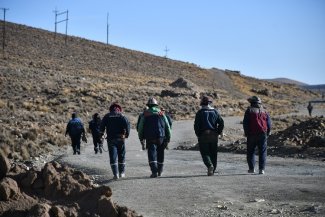
Maria do Castelo Faria, 73, has been going to bed earlier the last month. Not because she wants to get an earlier night, but because she can’t afford to pay last month’s electricity bill.
Faria earns a pension of €520 (US$568) per month, and lives with her 48-year old son, who suffers from schizophrenia. “It’s difficult. We lack everything in general, and have to cut wherever possible. I’ve cut down on “bicas” (coffees) and have started buying less bread.”
She attends a parish social centre in Lisbon, where she enjoys warm meals for lunch. “If I didn’t come here, I probably wouldn’t have food every day,” she says.
Sat around a table at the centre, groups of around 30 elderly people draw colourful pictures, one of their daily activities – which keeps them occupied and distracts them, albeit temporarily, from a precarious reality.
But due to austerity policies, Portugal’s social institutions are limited in terms of infrastructure and funds, which come mostly from social security funding and from attendee’s pockets, depending on what they earn.
"Elderly people have greater needs of support, hygiene and food. The funds we get have decreased over the years, so we have had to increasingly cut down on basic things, like food," says Isabel Almeida, head of the parish social centre, which receives donations from the food bank Banco Alimentar.
“The situation is shocking,” says Isabel Jonet, head of Banco Alimentar. “The elderly in Portugal today are very isolated. Nowadays families are unable to care for the elderly at home due to economic circumstances, so that tradition has been lost,” she explains to Equal Times.
Portuguese pensioners are among the worst-off in Europe, with the majority of pensioners in Portugal earning between €250 and about €500 (US$273-546) per month, according to figures released in 2013 by Portuguese database Pordata.
While old-age poverty started to decrease in the final years of the last decade, according to a study published in 2013 by the Paris-based OECD, the organisation fears that cuts introduced to the pension system since then will lead to higher poverty rates.
Saving on everything
Portugal’s debt crisis in 2011 forced the country to apply a severe set of austerity measures, including cuts in pensions, under terms of the country’s €78 billion (US$85 billion) international bailout.
Seventy-nine year-old Cecilia Pinto, who lives with her unemployed daughter and granddaughter and earns a monthly pension of €300 (US$327), eats her meals at the centre. For dinner, her family can usually only afford to eat soup.
“I would like to be able to occasionally eat what we felt like,” she says, hesitantly, when asked how she would like her life to be. “Conditions are fragile, but we just go on like nothing’s wrong.”
Pinto has to be inflexible with her budget in all areas of her life, and has stopped taking hot showers at home, mainly to save on water and gas bills.
Last year, the government approved a "sustainable contribution" tax ranging between 2.5 per cent and 3.5 per cent for pensions higher than €1,000 (US$1,092) per month, after the country’s Constitutional Court rejected cuts in pensions for being “unconstitutional.”
Though those with pensions below €500 haven’t been affected directly by the cuts, analysts say they have been affected indirectly.
“It is natural that most pensioners earning below the national minimum wage haven’t been directly affected because it is impossible to cut their pensions even more,” says Elisio Estanque, from Coimbra University.
“Elderly people have been affected as consumers however, having for example to pay higher fees to visit the doctor, and many have to leave their nursing homes and go back to their families’ households as a result of the economic situation.”
Those who don’t have access to social centres are even worse-off.
Eighty-year-old Palmira, who refuses to give her full name so as not to worry her family, has had to cut off gas and electricity at home altogether. She earns €400 (US$439) per month, pays a rent of €260 (US$285), and lives with both her daughter and granddaughter.
“My neighbour gives me bottles of water so I can have a shower, and I don’t cook at home, because it’s too expensive,” she says, burrowing her head in her hands. “All my life I had everything, and now I have to live in these conditions.”








